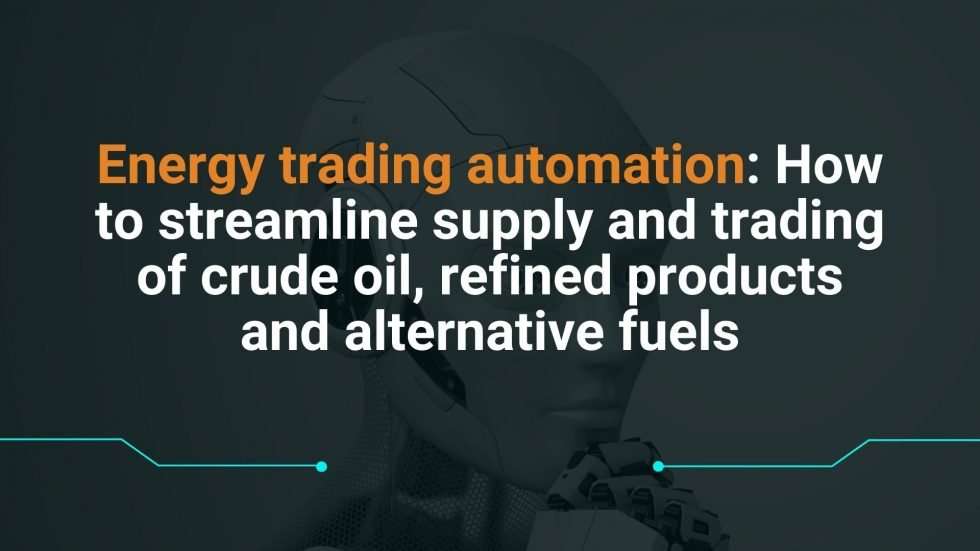Energy trading automation: How to streamline supply and trading of crude oil, refined products and alternative fuels - Inatech
- February 9, 2022
- Posted by: Inatech ETRM
- Categories:

Robotic process automation (RPA), machine learning (ML), and artificial intelligence (AI) are being successfully adopted across various industries. The energy market is no different. Owing to price volatility, high volumes of tradable commodities, fast-paced market, automation has become quintessential in power trading. When it comes to trading firms, RPA and AI are helping these businesses streamline repetitive tasks and automate front-, mid-, and back-office operations. This translates to reduced operational risks and improved efficiency across the trading lifecycle.
Let us dive deeper to understand more about automation and how it is transforming energy trading.
The Future Of Automation In Energy Trading Markets
As businesses continue to adopt digital processes and platforms, a huge amount of data is being generated from systems, processes, and feeds. Capturing and storing data is not only a challenge but also does not warranty useful insights. Therefore, the use of cloud storage and advanced analytics is giving the trading firms the required competitive advantage in this time-critical market. Let us see how.
- AI is bringing some significant changes, especially in power trading. Since the historical data provide limited information in the renewables market, AI is helping traders predict load and generation profiles.
- AI-based tools are also finding applications in the European energy trading landscape with algorithmic trading tools being equipped with ML capabilities. Especially traders in intraday liquid markets who handle huge amounts of data in a highly dynamic market are utilising trading algorithms to achieve a competitive edge and success. In fact, it has been observed that manual traders find it difficult to keep up with algorithmic traders and also as market liquidity improves, algorithmic trading is exploited more.
- RPA is being implemented in the back-office and administrative operations. This is primarily because such repetitive tasks including payment processing are not entirely based on analysis or subjective judgment.
- In the front office, the use of automation and technology will have a direct impact on the skills of the traders. How? Intelligent, intuitive automation can provide more value from the usual 24×7 shift trading model wherein the traded activity varies significantly from that in the front office.
- Moreover, the adoption of the Internet of Things (IoT) will propel automation and AI across mid-office operations, giving businesses the advantage to tap into additional, value opportunities.
Undoubtedly, AI will continue to address the challenges in the energy market over the next decade and the trading firms will continue to invest in automation for applications across various use cases. Successful implementation of AI in energy trading will depend on industry knowledge as well as a high level of technical expertise.
Can Trading Be Automated?
The simple and straightforward answer is yes! Automation can help increase the speed of execution significantly. Based on the current market scenario especially in power and gas markets, to gain a competitive edge, it is increasingly important to secure the best deals. The task of finding good deals manually in front of a screen is going to get increasingly complex and difficult. That is why automated trading can help traders place and execute deals in real-time and that too effectively. This will give more time to traders to focus on analyzing markets, developing strategies, and modifying their algorithms.
Automated trading software can help you do so! This software not only helps you in the placement and execution of trades but also help you run algorithmic trading strategies as a preliminary step. It also helps analyze market data including prices, forecasts, and updates as well as assess your algorithmic trading strategy and place orders on the market, that too within a very short time span!
What Is An Energy Trading System?
Energy trading and risk management or ETRM software is primarily a category of software applications, architectures, and tools that help in supporting the business processes in commodity trading in the energy market. Used by oil traders, suppliers, distributors and wholesalers, ETRMs help companies assess market information to make data-driven decisions and maximise margins.
ETRM software also enables operators to automate these outdated processes. This saves money and improves the efficiency of operations by streamlining trading, hedging, credit, cash flow, operations and inventory. It assists in managing risk and operating complex integrated supply chains for energy commodities. Moreover, it handles complex interfaces effortlessly manages all front, middle and back-office needs, making it a cost-effective option for oil trading companies.
To know more about the best-in-class, real-time, end-to-end ETRM solution, click here.
How Much of Trading Is Automated?
Some reports suggest that about 20 per cent of the intraday gas and power market is automated. This number represents a significant growth in algorithmic trading.
Many organizations are now trying to overcome their traditional processes and infrastructure to make way for implementing automated processes and technologies. No doubt, these changes will bring rapid improvement in the energy trading landscape-improving data quality and insights, enabling time-sensitive decisions, and creating more value for businesses.




